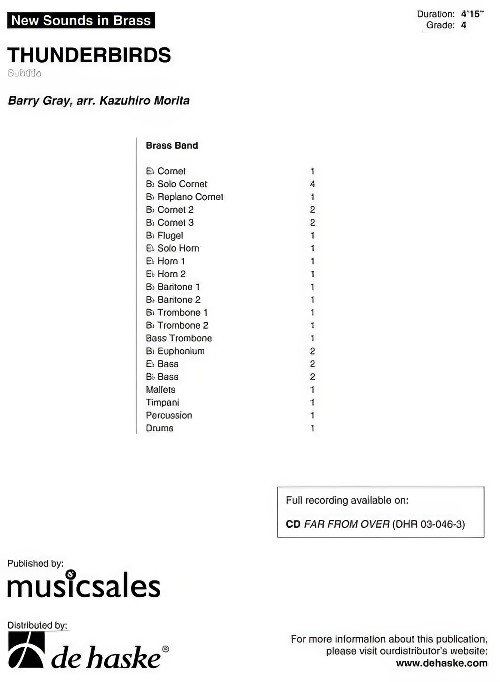Results
-
 £12.50
£12.50God Rest Ye Merry Gentlemen (Brass Band - Score only) - Condon, Leslie
A short but interesting arrangement featuring dynamic and rhythmic contrasts.
Estimated dispatch 7-14 working days
-
 £34.95
£34.95Il Est Ne (He Is Born) (Brass Band - Score and Parts) - Norbury, Kevin
This French traditional carol has great charm and grace. This arrangement calls for rhythmic vitality, delicacy and sure-footedness.
Estimated dispatch 7-14 working days
-
 £17.50
£17.50Il Est Ne (He Is Born) (Brass Band - Score only) - Norbury, Kevin
This French traditional carol has great charm and grace. This arrangement calls for rhythmic vitality, delicacy and sure-footedness.
Estimated dispatch 7-14 working days
-
 £29.95
£29.95In Perfect Peace (Brass Band - Score and Parts) - Downie, Kenneth
This sensitive setting of the song 'Thou wilt keep him in perfect peace' is one of the best recent examples of a hymn arrangement, paying full regard to the melodic characteristics and sentiments of the lyrics.
Estimated dispatch 7-14 working days
-
 £14.95
£14.95In Perfect Peace (Brass Band - Score only) - Downie, Kenneth
This sensitive setting of the song 'Thou wilt keep him in perfect peace' is one of the best recent examples of a hymn arrangement, paying full regard to the melodic characteristics and sentiments of the lyrics.
Estimated dispatch 7-14 working days
-
 £29.95
£29.95Masters In This Hall (Brass Band - Score and Parts) - Bearcroft, Norman
A highly rhythmic arrangement of a French traditional carol.
Estimated dispatch 7-14 working days
-
 £14.95
£14.95Masters In This Hall (Brass Band - Score only) - Bearcroft, Norman
A highly rhythmic arrangement of a French traditional carol.
Estimated dispatch 7-14 working days
-
 £34.95
£34.95So Glad (Flugel Horn Solo with Brass Band - Score and Parts) - Himes, William
An arrangement, in big-band style, of the song 'I am so glad'.
Estimated dispatch 7-14 working days
-
 £17.50
£17.50So Glad (Flugel Horn Solo with Brass Band - Score only) - Himes, William
An arrangement, in big-band style, of the song 'I am so glad'.
Estimated dispatch 7-14 working days
-
 £74.99
£74.99Thunderbirds (Brass Band - Score and Parts) - Gray, Barry - Morita, Kazuhiro
Who doesn't know the children's TV series Thunderbirds. The Gerry Anderson classic is still as popular today with both children and adults as when it was first shown in the sixties. This arrangement of the theme tune will be loved by all and will leave your audience humming it all the way home. Duration: 4.15
Estimated dispatch 7-14 working days
